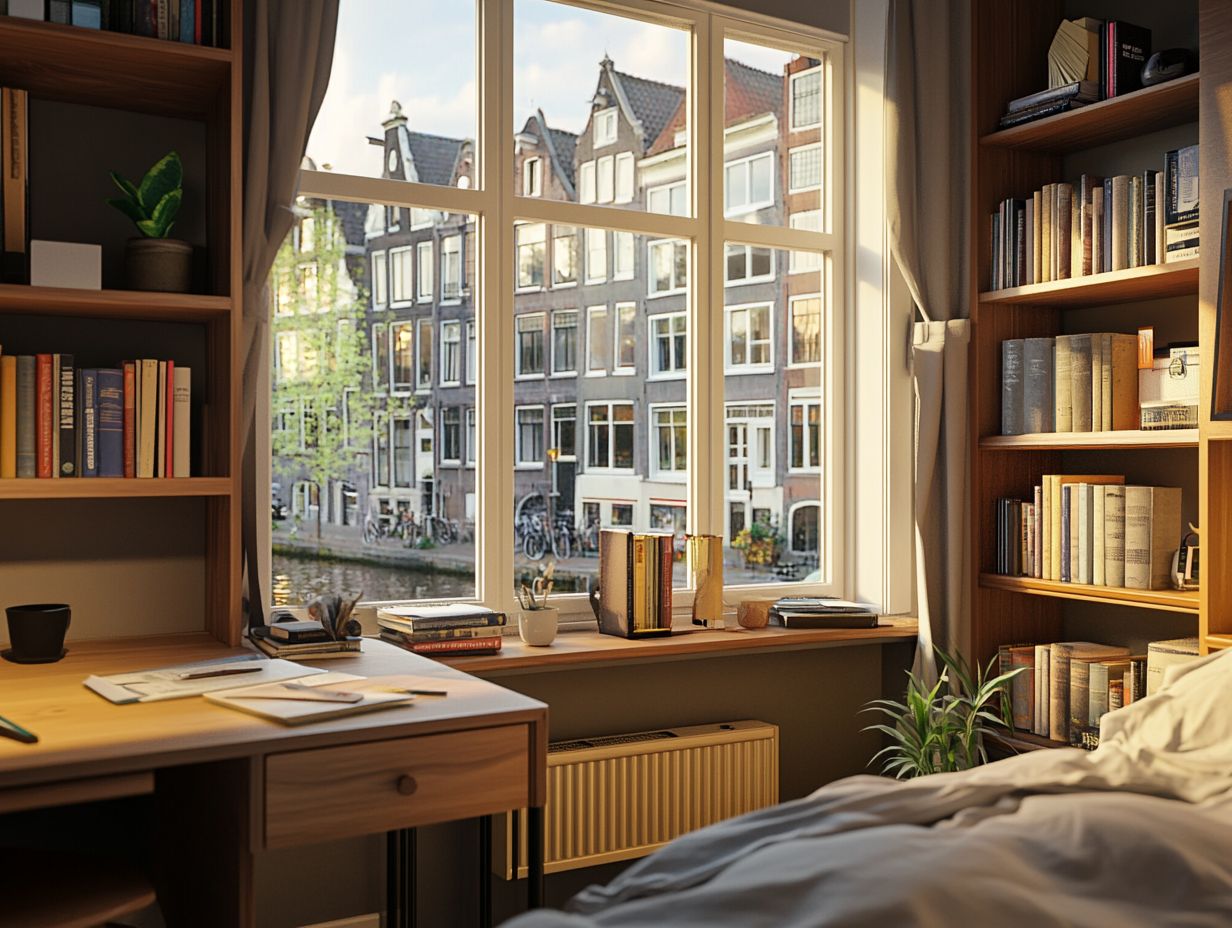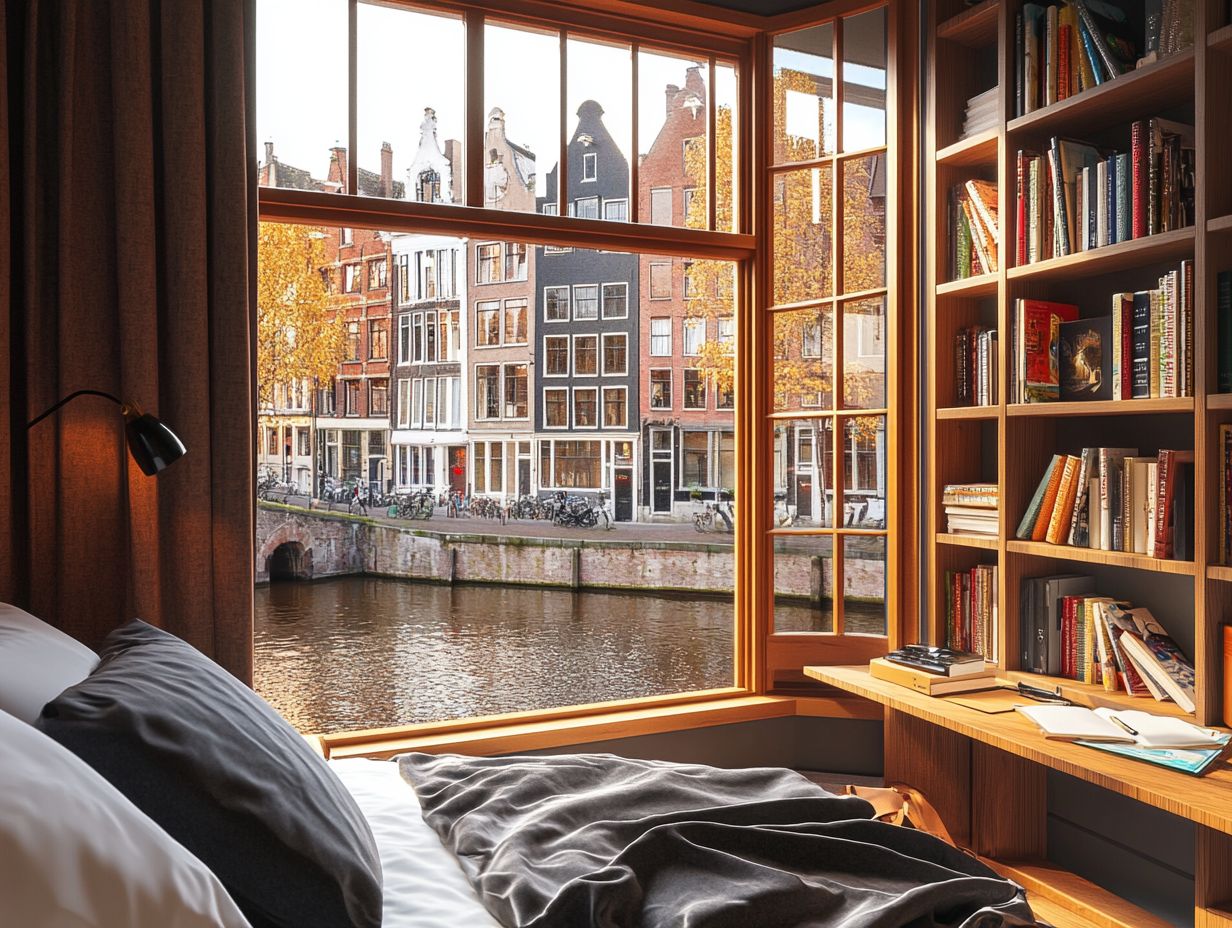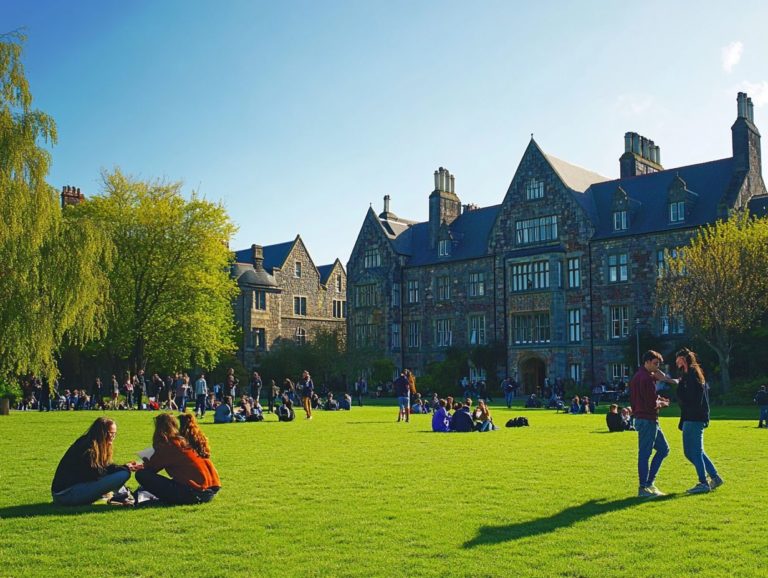A Guide to Student Housing in the Netherlands
Navigating the student housing market can feel like a daunting expedition, particularly for those new to the experience. This guide provides a comprehensive overview of the diverse types of student accommodations available, ranging from shared spaces and dedicated residences to private rentals.
When making your choice, consider key factors such as location, cost, and amenities. The guide also delves into the application process and offers valuable tips to help you secure the perfect place.
Whether you’re a first-time renter venturing into this arena or a seasoned student, this resource equips you with insights to make your housing search smoother and more informed.
Contents
- Key Takeaways:
- Types of Student Housing
- Factors to Consider When Choosing Student Housing
- Applying for Student Housing
- Tips for Finding and Securing Student Housing
- Frequently Asked Questions
- What is the best time to start looking for student housing in the Netherlands?
- What are the different types of student housing available in the Netherlands?
- What is the average cost of student housing in the Netherlands?
- Do I need to pay a deposit for student housing in the Netherlands?
- Can international students apply for student housing in the Netherlands?
- Are there any websites or agencies that can help me find student housing in the Netherlands?
Key Takeaways:

- Research and network to find the best student housing options in the Netherlands.
- Consider location, cost, and amenities when choosing student housing.
- Be prepared for the application process and understand the requirements before applying for student housing in the Netherlands.
Overview of the Student Housing Market
The student housing market in the Netherlands is a hot topic, especially with the rising number of international students especially those from India looking for affordable and comfortable living options. As student enrollment surges, housing becomes increasingly scarce.
This competition affects rental prices and the availability of university housing. Understanding this market is key to making the best choice.
Whether you re looking at shared apartments, furnished units, or dedicated student residences, it s important to consider your cultural experiences and the significance of community integration.
With rental prices rising fast, you might find yourself facing tough choices. Shared apartments can be a budget-friendly option, offering a sense of community. Conversely, purpose-built student residences provide handy amenities and social spaces that can enrich your overall experience.
For Indian students, the challenge extends beyond merely securing a place to live; it s also about finding an environment that resonates with your cultural values and lifestyle preferences. Navigating this intricate landscape calls for adaptability and resourcefulness.
Types of Student Housing
When exploring student housing in the Netherlands, it s crucial to delve into the diverse types of accommodation available. From shared apartments to dedicated residences and private rentals, each option has its own advantages.
Shared apartments offer a budget-friendly lifestyle while fostering a vibrant sense of community. Dedicated student residences often come equipped with services designed to meet student needs.
If you value independence and flexibility, private rentals ranging from furnished apartments to short-stay options might be the perfect fit for your housing aspirations.
Shared accommodation presents an excellent opportunity for students seeking affordable living options. By splitting rental costs, you lighten your financial load and cultivate a sense of community.
This type of housing often requires finding roommates, which can be facilitated by various housing agencies and online platforms designed for students. The benefits extend beyond financial savings; daily interactions with individuals from diverse backgrounds offer invaluable life experiences.
To enhance your chances of finding compatible roommates, clearly outline your preferences and lifestyle habits when using these platforms. Many housing agencies provide essential resources and support during the roommate selection process.
Attending local housing fairs or joining university-specific forums can improve your search for ideal living arrangements. Embracing shared living not only alleviates financial pressures but also enriches your social experience throughout your academic journey.
Student Residences
Student residences present an ideal solution if you’re seeking campus housing that blends convenience with community engagement. You ll find a supportive environment designed to cater to both your academic and social needs.
These living spaces foster social interactions and help you build networks that can last beyond your college years. Many universities in the Netherlands cultivate vibrant student communities where shared experiences and collaborative learning thrive.
With flexible rental agreements, you can enjoy peace of mind that comes with secure housing, often inclusive of essential utilities like water and internet. These residences usually offer common amenities such as fitness centers, lounges, and organized events, encouraging you to connect, share ideas, and form friendships.
This ultimately enriches your overall university experience.
Private Rentals

Private rentals offer you the flexibility to choose accommodations tailored to your specific needs, whether a furnished apartment or an independent living arrangement. This option often provides greater privacy, making it ideal for those who prefer to avoid shared living situations.
Be mindful of rental costs and details of rental contracts, including important information about utilities and sub-letting options (the option to rent out your place to someone else), to ensure a smooth renting experience.
Navigating the landscape of private accommodation can feel overwhelming, but understanding the benefits and challenges is important. You gain more control over your living environment while cultivating independence in managing your finances.
Make sure to check rental agreements carefully to avoid surprises and ensure that leases align with your requirements.
Being proactive in researching rental scams is crucial. Always verify listings through multiple channels and never pay deposits without clear, legitimate contracts. By taking these precautions, you can find housing that enhances your educational journey.
Factors to Consider When Choosing Student Housing
When selecting student housing in the Netherlands, several key factors can profoundly influence your experience. Location, accessibility, rental costs, and available amenities all play important roles in your decision-making process.
Evaluate your budget carefully, as living expenses can fluctuate dramatically based on the city and type of accommodation you choose. Familiarizing yourself with the cultural details of various neighborhoods can elevate your student lifestyle, making it essential to ensure that your housing choices harmonize with your academic goals and social endeavors.
Location and Accessibility
The location and accessibility of student housing are crucial for a smooth academic journey. Being close to university campuses and public transport options significantly impacts your daily commutes. In student-friendly cities like Amsterdam, Rotterdam, and Utrecht, access to public transport simplifies your life and opens doors to cultural experiences and social networking opportunities.
Living within a short distance of key public transport hubs allows you to navigate your city effortlessly, reducing travel time and alleviating stress from busy schedules. A well-connected location means you can embark on spontaneous outings to art exhibits, festivals, and historical sites, enriching your experience beyond the classroom.
If you live near tram and bus lines, you can easily explore vibrant neighborhoods and engage with local communities, fostering connections that enhance your educational journey. Ultimately, choosing the right place to live is about more than convenience; it’s a fundamental aspect of cultivating a well-rounded and fulfilling student life.
Start your search for the perfect student housing today!
Cost and Budgeting
Understanding rental costs and budgeting are critical as you navigate the housing market in the Netherlands, where average rent can vary significantly between cities and types of accommodation.
As you embark on this journey, it’s essential to familiarize yourself with the average rental prices in major cities like Amsterdam, Utrecht, and Rotterdam, where rents can differ dramatically. Beyond the base rent, factor in various other expenses, such as utilities, internet, and potential maintenance fees, which may or may not be included in your rental agreements.
Carefully reviewing these agreements is key to grasping your financial commitments and avoiding hidden costs that could disrupt your budgeting plans. By taking all these factors into account, you can better prepare for a stable living situation that supports your academic pursuits.
Amenities and Facilities
When you’re evaluating student housing options, amenities and facilities play a crucial role in shaping your overall living experience and can strongly influence your accommodation choices. Features like communal areas, shared spaces, and study zones create a vibrant student community, encouraging interaction and collaboration among peers. Reflect on your personal preferences for amenities, especially if you’re leaning toward independent living arrangements.
Take, for example, gym facilities, lounges, and game rooms. They offer relaxation opportunities and foster social connections that can blossom into lasting friendships. Study lounges equipped with high-speed Wi-Fi and plenty of outlets provide the perfect setting for academic collaboration, especially for those who thrive in group study sessions.
Shared kitchens allow you to cook alongside fellow residents, cultivating a sense of home while promoting cultural exchanges. Other essential amenities, like laundry facilities, security features, and proximity to public transport, add to the convenience and appeal of student living, making it an attractive choice for many.
Applying for Student Housing

Applying for student housing in the Netherlands is a journey that involves several important steps to help you secure a place that perfectly aligns with your needs. Start gathering your necessary documents today to avoid last-minute stress, then proceed to submit your applications to various housing providers.
Familiarizing yourself with the application process is essential for achieving a successful outcome. It’s wise to understand the contract details, including the terms and conditions, to ensure a seamless transition into your new living space.
Application Process and Requirements
Navigating the application process for student housing demands a keen understanding of the specific requirements laid out by various housing agencies and providers. Your application needs to be carefully organized. Typically, you will need to submit essential documents such as proof of enrollment, identification, and financial statements, making organization and timeliness crucial.
Familiarity with rental agreements contracts between you and your landlord that outline your rights and responsibilities can significantly simplify your transition into student life.
Along with these core documents, be ready to provide letters of recommendation from academic advisors or faculty members who can attest to your character and dedication to your studies. Compile all these documents early and keep them organized; missing paperwork can lead to unnecessary delays.
Don t forget to check those application deadlines they’re crucial! Consider utilizing a checklist to keep track of your submissions.
Gaining an understanding of the local housing market can offer valuable insights into affordable options, enabling you to make informed decisions while discussing your specific needs with potential landlords.
Tips for Finding and Securing Student Housing
Finding and securing the right student housing can feel overwhelming. However, with the right strategies in place, you can significantly boost your chances of success in this competitive market.
By utilizing online platforms and housing portals, you can access a wealth of valuable listings and information. Engaging with student associations and social media groups allows you to tap into local insights and resources that are often overlooked.
Taking these steps will not only help you find the best housing but also make your student life richer.
Networking and Researching
Networking and researching are essential elements of your housing search journey. They allow you to access valuable information and uncover potential leads on available accommodations.
By leveraging these resources, you can discover listings that aren’t widely advertised. This gives you a competitive edge over other seekers. Connecting with fellow students through university-organized events or local meet-ups often reveals firsthand experiences and recommendations about various housing options.
These interactions are crucial, as they provide insights that online platforms might overlook. Utilizing platforms specifically designed for student housing, along with engaging with past renters, can streamline your search process, making it more efficient and less overwhelming.
Ultimately, combining interpersonal connections with digital tools can significantly enhance your ability to secure a comfortable and affordable living space.
Negotiating and Signing the Lease
Successfully negotiating and signing a lease is an important step as you finalize your housing arrangements. It ensures that both you and the landlord are clear on the terms outlined in the rental agreement.
It s important to approach this process with a comprehensive understanding of the contract details, including rental costs, duration, and any specific house rules set by the housing provider. This diligence not only safeguards your interests but also fosters a positive relationship with landlords and roommates.
Be mindful of common pitfalls such as hidden fees, security deposit terms, and unreasonable clauses that could impact your living experience. Before diving into negotiations, take the time to research similar rental properties to bolster your negotiating power.
Identifying aspects you can be flexible about will give you leverage during discussions, potentially leading to more favorable terms.
Always read the fine print. Understanding the implications of each provision will help you avoid misunderstandings and conflicts down the line. Be ready and informed to seize the best opportunities!
Frequently Asked Questions

What is the best time to start looking for student housing in the Netherlands?
The best time to start looking for student housing in the Netherlands is 3-4 months before your arrival. This will give you enough time to explore different options and secure a place before the start of the academic year.
What are the different types of student housing available in the Netherlands?
The most common types of student housing in the Netherlands are shared apartments, student dormitories, and private studios. Shared apartments offer a more social experience, while private studios provide more privacy.
What is the average cost of student housing in the Netherlands?
The average cost of student housing in the Netherlands varies depending on the location and type of accommodation. On average, students can expect to pay between 300- 600 per month for a room or studio.
Do I need to pay a deposit for student housing in the Netherlands?
Yes, it is common for landlords to ask for a deposit when renting a student room or studio in the Netherlands. This is usually equivalent to 1-2 months’ rent and will be returned to you at the end of your stay if there are no damages.
Can international students apply for student housing in the Netherlands?
Yes, international students can also apply for student housing in the Netherlands. However, it is important to start the application process early and have all the necessary documents ready to increase your chances of securing a place.
Are there any websites or agencies that can help me find student housing in the Netherlands?
Yes, several websites and agencies specialize in student housing in the Netherlands. Some popular options include HousingAnywhere, Kamernet, and SSH Short Stay.
Join Facebook groups for international students in your city. Members often share housing listings and useful tips.
Finding a place to live can be exciting! Start your search today and make the most of your student experience in the Netherlands!






